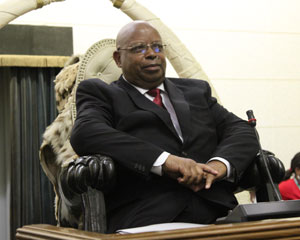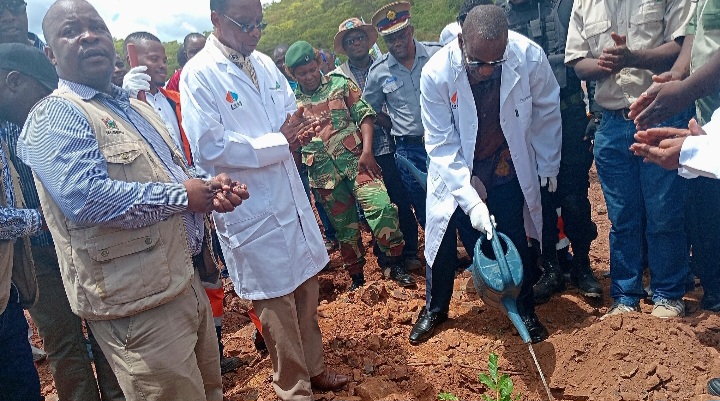Zimbabwe Speaker of Parliament Advocate Jacob Mudenda
By Dickson Bandera
Zimbabwe Speaker of Parliament Hon Advocate Jacob Mudenda yesterday addressed a Parliamentary meeting hosted by the IPU and the Federal National Council at the 28th United Nations Climate Change Conference (COP28), where he shared the efforts being taken by the Zimbabwean government in implementing global commitments.
The gathering convened global parliaments to facilitate knowledge sharing, international cooperation, and the exchange of best practices for climate action. The event aimed to create an inclusive platform for parliamentary dialogue, elevating parliamentary voices, and supporting urgent climate efforts both nationally and internationally, translating COP commitments into actionable realities.
Zimbabwe, which is determined to promote sustainable measures to protect the earth and life that flourish upon it, is one of the countries actively participating in climate change mitigation and adaptation initiatives as evidenced by the legal framework now in place. Advocate Mudenda’s presentation was therefore important in putting the global community in picture of the progress being made by the Southern African agro-based country which is equally affected by the effects of climate change.
The assembly coincided with the inaugural Global Stocktake (GST) of the 2015 Paris Climate Agreement’s imperative to collectively assess the limitation of the rise of global temperature to 1.5 degrees celsius, building resilience and aligning financial flows with low greenhouse gas emissions and climate resilient ecosystem.
This Global Stocktake is anchored on Mitigation Action, Adaptation and Means of Implementation at country levels guided by their Nationally Determined Contributions (NDCs).
Said Hon Mudenda, “Accordingly, the Zimbabwean Parliament has embraced the implementation of the Zimbabwe Nationally Determined Contributions in collaboration with the Executive through the oversight role of its Environment Portfolio Committee and its Thematic Committee on Climate Change housed in the Senate which continually ensure that there is compliance in the reporting, monitoring and reviewing of the Paris Agreement obligations.
“Thus, in 2015, Zimbabwe committed itself to reducing its energy sector greenhouse gas emissions by 33% per capita by 2030. In 2021 Zimbabwe revised upwards its NDCs ambition to 40% per capita by 2030,” underscored Hon Mudenda.
Zimbabwe has demonstrated commitment to the international milestones and has ratified and domesticated climate change and ozone layer depleting international agreements such as the United Nations Framework Convention on Climate Change and its Paris Agreement, the Vienna Convention for the protection of the ozone layer and its Montreal Protocol as well as the Kigali Amendment on substances that deplete the ozone layer in an effort to demonstrate Zimbabwe’s commitment to containing climate change catastrophic impacts.
Advocate Mudenda informed the house of the legal frameworks and policies that have been put in place by Zimbabwe to guide the local implementation of the global agreements.
“Furthermore, Parliament working collaboratively with the Executive, is implementing critical environmentally related policies such as the country`s Vision 2030, National Climate Policy, National Climate Change Response Strategy, National Climate Change Learning Strategy, the Climate Change Communication Strategy, the Renewable Energy Policy and the Bio Fuels Policy.
He also revealed the plans to enact a full act if Parliament to regulate climate change.
“Soon, Parliament will enact a robust Climate Change Act in order to legally synchronise all the climate change policies in Zimbabwe,” said the legislator.
An example of the Biofuel initiatives is one project run by the Ministry of Energy and Power Development titled the Institutional Biogas Programme. The project, being implemented by the Rural Electrification Fund (REF), has seen the construction of biogas facilities at rural households which were off the main grid and this has alleviated the burden on women and the girl child who used to walk long distances to fetch firewood. The programme also addresses the cooking needs of institutions such as schools, hospitals and prisons.
Hon Mudenda told the parliamentarians that the implementation of these policies has canvassed a stout national budget for effective execution.
He closed his remarks by thanking the on the hospitality tendered by the hosts.
“Zimbabwe acknowledges the excellent hospitality tendered by the Speaker of the Federal National Council as we wish COP28 UAE positive outcomes. Climate change should not conquer humanity. Humanity must conquer climate change decisively,” he remarked.


